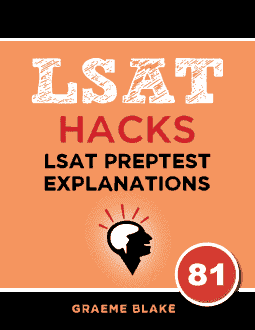QUESTION TEXT: The position that punishment should be proportional…
QUESTION TYPE: Role in Argument
CONCLUSION: It is unsustainable to argue that both:
- Punishments should be proportional to the seriousness of the crime, and
- Repeat offenders should get worse punishments than first time offenders.
REASONING: If both of those statements are true, then it means that repeat offences are relevant to the seriousness of a crime. But if that’s true, then lots of other old things would be relevant. In which case it would be basically impossible to figure out proportionality.
ANALYSIS: Unusually, this argument is flawed. Normally, role in argument questions are not flawed arguments. LSAC is clearly switching things up, breaking patterns, and making things more difficult. Just look at how long this explanation is!
The author says there are two considerations for sentencing:
- Punishment should relate to seriousness, and
- Repeat crimes should get harsher punishments
The author thinks that if you believe these two ideas then you also believe that repeat crimes make an offence itself more serious. That’s damned nonsense!
Shoplifting is less serious than break and entry. No question about it. Almost every single instance of shoplifting is less serious. But….who has caused more harm to society, someone who shoplifts 10,000 times, or someone who breaks and enters once, and gets caught? The serial shoplifter. And, who is more likely to be reformable? Probably the first time criminal. Those are the reasons for being more lenient with first time offenders, and it does not only depend on only on the seriousness of the offence.
The author also argues against an argument nobody is making. The author mistakenly thinks is that if we consider repeat offences, we’d have to consider all kinds of old stuff such as childhood, education, etc. when considering seriousness. This isn’t true, but it’s the argument the author makes.
Role in Argument
Basically they’re saying:
- Whether a criminal committed a crime before is something old, and “remote” to the crime.
- Something something, reasoning error, therefore point #1 must be relevant to seriousness. [The author never actually justified this point. The “something something” is an unstated assumption they left in their head and didn’t tell us. The argument really is that bad.]
- Therefore, many old things must be relevant to seriousness.
Point 2 is an error, the author didn’t support it. But, its role in the argument is to justify point 3.
___________
- On a normal role in argument question, this would be the right answer. The author indeed uses the statement in their reasoning. And if they had made a good argument and given grounds to accept the statement, this answer would be right. But as I explained above, the author made a bad argument. LSAC is changing things up here: going forward you’ll have to consider the correctness of the argument on role in argument questions.
“It implies” is the statement that isn’t supported. We can’t just “imply” things when we make argument. We have to say how one thing proves another. - The argument is asking about the second sentence. The author says “it implies” meaning that the second sentence is inferred from the first sentence. So far, so good. But, the first sentence is one that the author attacks. They’re not defending it. They say the idea in the first sentencing “is unsustainable” meaning it “is bad” or “we can’t do it in practice”.
- Actually, the overall conclusion is the first sentence: [It] is unsustainable. The argument has this structure:
1. [It] is unsustainable
2. It implies
3. If….were relevant
4. But….impossible
Read together, this means: “Some people say #1. #1 implies this. If so, remote stuff would be relevant, but this would be impossible. So, the implication is wrong” - CORRECT. The first sentence is the conclusion. The words “is unsustainable” are the indicator. So, the author is rejecting the view in the first sentence (“is unsustainable” = “we can’t do it”). “It implies” means that the author things the view in the first sentence (“it”) means that we must consider many past events relevant to seriousness. So, the author thinks this is a consequence of the view in the first sentence.
Finally, the word “allegedly” here is appropriate. as I explained above, the author is wrong and has made a bad argument. It’s rare for “role in argument” questions to have flawed arguments, but this shows that LSAC is switching things up and expecting you to evaluate the strength of arguments when assessing their meaning. - I wouldn’t say there’s an intermediate conclusion here. The author is simply joining together a conditional chain: remote considerations relevant —> every other consideration also relevant —> impossible to determine the seriousness of an offence.
Suppose I say: “This implies there is a cat on the balcony. If something is a cat, it likes to eat meat. This would mean that my barbecue may be at risk. Cat —> likes to eat meat —> barbecue may be at risk”
There’s no intermediate conclusion there. It’s a fact, and followed by two conditionals. An intermediate conclusion is more like this:
“This implies that remote considerations are relevant. And relevant things are scary. So, we can conclude that remote considerations are scary. And, it’s impossible to determine the seriousness of an offence of people are scared. Therefore, it can’t be true that remote considerations are relevant.”
An intermediate conclusion is something we conclude based on other statements, which in turn justifies the conclusion. You need a word like “so”, and not a simple factual word like “if”.

Free Logical Reasoning lesson
Get a free sample of the Logical Reasoning Mastery Seminar. Learn tips for solving LR questions


Leave a Reply